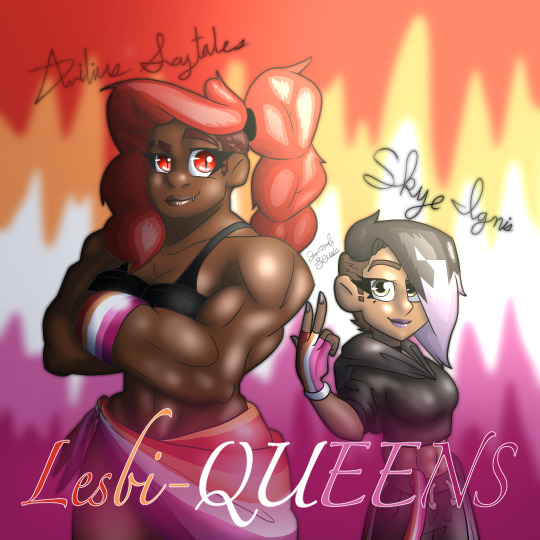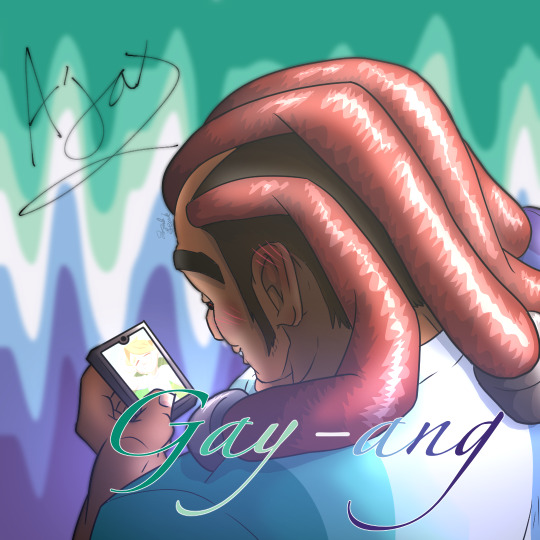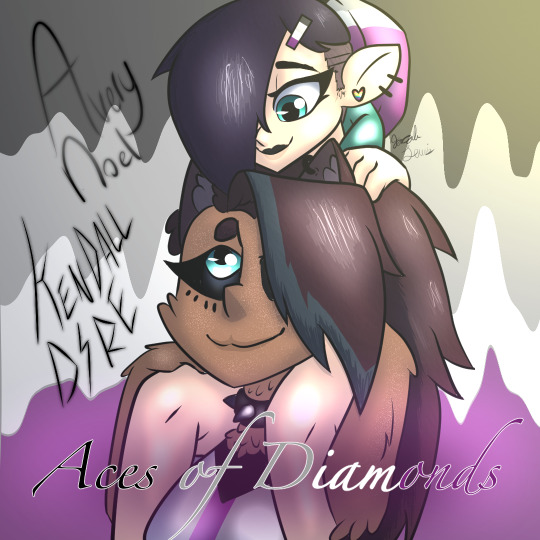#ajax the anomalous
Explore tagged Tumblr posts
Text






Happy Pride Month 2024!!!!
This years pride, I wanted to make a bit more special.
I wanted to expand the number of characters I had from previous Pride months. So, I separated each into their orientations and put a lot of effort into not only the number but the quality of the characters.
I tried to keep all the orientations in order based on their location in the acronym. So, some characters have yet to be included. Since some of their sexualities aren't included in the acronym/are lesser known. I may add them in other images this month, but I just wanted to get this out into the world.
Now, some of them I'm not entirely happy with, but I do enjoy a lot of the characters I decided to include. (By the way, I plan on creating more male gay characters. I didn't realize how few I had until I was making this).
I might also hopefully be attending a Pride event this year, and I even got some merch to dress up for the event.
I hope you enjoy this years pride pics. Happy Pride Month!!!!!
#cataract#cartoon#my ocs are my children#my oc#my ocs#my original art#oc#my art#my oc art#superhero#the anomalous#theanomalous#timber#aniliusscytales#avery noel#red serpent#rime#archangel#necromancer#skye ignis#cheetah girl#karasi ele#harper iman#kendall dire#ira fey#ajax the anomalous#bubba and lucy
1 note
·
View note
Text
Spira OST 1
A catalogue of carefully handpicked and curated music for the Spira experience
This part just showcases the battle themes and other misc.
Next update would be the cities/towns/other places + routes themes
Spira Character Battle Themes
Optional/Secret:
Maxine Rosewood
Gym Leaders:
Alexei Maxim
Aster Miller
Claudia Laurent
Ella Baldwin
Elena Beaumont
Estrella Lawrence
Laura Baldwin
Emile Rosewood (Option A) / Emile Rosewood (Option B)
Spiran Elite Four:
Ajax Adams
Olivia Beaumont
Morgan Pennywort
Cleo Morrison
Spiran Champion:
Stella Eclair (Pokémon Trainer) / Stella Eclair (Champion)
Team Celestial Themes And Battle Themes
Celestial HQ
Celestial Takeover
Celestial Grunt
Celestial Hoplite
Celestial Oracle
Maximillian Corporation (Celestial Occupation)
Prisma Observatory (Celestial Main HQ)
Celestum Prismata Stratos Ship
Admin Hades
Admins Phobos and Deimos
Admin Hephaestus
Admin Eris
Admin Athena
Leader Zeus
Leader Zeus (Celestum Prismata Stratos Ship Fight)
SYM Project Themes
SYM-01
SYM-02
SYM-03
SYM-04A + SYM-04B
SYM-05
SYM-06
SYM-07
SYM-08
SYM-09 (First Appearance/Fight) / (Meteoric Crash Site) / (Celestum Prismata Stratos Ship) / (Final Phase)
SYM-10
Misc. Themes
Battle for Argentum City
Meteoric Crash Site Wild Encounter Theme
Cryptid Isle Wild Encounter Theme
Anodyne Amusement Park Wild Encounter Theme
Anomalous Crater Wild Encounter Theme
Wild Pokémon Encounter Theme
Rare Wild Pokémon Encounter Theme
Cave Pokémon Encounter Theme
Surf Wild Encounter Theme
Mt. Agni Wild Encounter Theme
1 note
·
View note
Note
[Ajax had been found passed out and without any belongings near the centre of an anomalous energy reading. First tests showed that they seemed perfectly healthy and human. Completely normal except for two things. Their unusually coloured orange eyes and readings of an unknown energy being emotted by them. With the goal of either changing that energy into something, they already knew how to harvest or, finding a way of using that energy as a power source or for some new technology, CCRP kept Ajax locked away and sedated, and tested various chemicals, as well as physical influences like radiation on them. It didn't lead to the results they were hoping for, but they reported unexpected physical changes in the form of horns growing on their head, a tail, and scale-like structures in different parts of its body.]
Hey sorry it took longer than expected Christmas kinda threw a wrench into things, but I got the papers.
@calaverage
That's fine. I've managed without them this long, one week more or less don't make much of a difference. Where can I get them?
55 notes
·
View notes
Text
“Helen's character in the Iliad has usually been taken at face value by scholars: they describe her rueful responses to Priam and Hector and her angry rejection of Paris and Aphrodite as sympathetic depictions, often without analyzing in any detail the ambiguous quality of these verbal exchanges. I suggest, in contrast, that in these exchanges 1) Helen's apparent tone often does not match her ultimate intention, and 2) the speech types she uses— which range from the mournful widow's to the flyting warrior's—are transposed from their usual contexts to form locutions unique to her. Helen is also significantly aware of her centrality to the narratives of others, manifesting a concern for reputation (kleos) that connects her to the Muses, the Sirens, and ultimately the poet, as a number of scholars have recognized.
In the Teichoscopia (//. 3.141-244), for example, when she is asked by Priam to name a warrior, Helen uses her identification of Agamemnon to frame an elegiac look at her own past, thus substituting her story for his. Her reply is not particularly suited to the context. In fact, it somewhat resembles in content Andromache's mournful speech in book 6, when the latter bewails her widow's fate to her living husband. Andromache's voice, however, is consistently grief-stricken, and her use of the mourner's topoi (e.g., lamenting family ties, dilation on the effect the death will have on one's life) coheres with her role as loyal wife. Helen's rueful self-reference instead mingles regret with an emphatic awareness of her own singular status.
When Priam asks Helen to name Ajax, her identification moves quickly from his epithets to the Cretan leader Idomeneus, who as a guest-friend of Menelaus reminds her again of her own story, and she remarks on the absence of her brothers from the battlefield (3.234-42). She then conjectures that their absence can be explained by their fears of shame and reproach that are rightfully hers (3.242). Since she views the actions of others as dependent on her error and rues bitterly this damage to her reputation, Helen assigns herself the crucial role in others' stories, thereby giving voice to the blame tradition that the narrator avoids. Her sense of her public reputation is anomalous among the female figures in Homeric epic; kleos is rightfully the concern of the warrior, not of the warrior's prize.
Like any good warrior (and unlike her paramour), she fears the insults of others (3.242, 3.412, 24.767-68) and recognizes the vulnerability of her public position. Helen, in contrast to the chaste Andromache, treats her story—in part the battles waged essentially for her that she weaves in her second husband's halls (//. 3.125-28)—as if it were the story most central to every warrior's life. And this in some sense is the case: whereas the mourning wife's story would only be properly told in keening over her husband, Helen's story is on the lips of everyone, since it is relevant to all the warriors. As the catalyzing, fateful figure for these heroes, her story is their story; her own kleos is inevitably bound up with the kleosoi each.
But the complexity of Helen's figure and voice in this scene does not end there. Before she lapses into self-reflection in response to Priam's first inquiry, she says that he is worthy of veneration (aiSoioç ) and fearsome (ôeivôç ) in her eyes (3.172), using a show of extreme respect that implies an apologetic attitude consistent with her penchant for self-abuse, the primary stylistic tendency unique to her. Helen then declares, in reference to her coming to Troy, "Would that evil death had pleased me" (3.173 -74), invoking in a sensuous manner the end point with which she is associated. She makes a similar (though blander) declaration in her mourning speech over the body of Hector in book 24: "Would that I had been destroyed before" (764).
Andromache uses a related construction when, as Hector is dragged around the city walls, she regrets that Eetion bore her (22.481). In book 21, fearing an unheroic end to his life, Achilles cries out to Zeus in prayer: "Would that Hector had killed me" (279). In the Odyssey, the shade of Achilles wishes something similar for Agamemnon: "Would that you had met your death and fate in Troy" (24.30- 31). Most famously, in Odyssey 5 Odysseus exclaims as he faces the storm near Scheria, "How I wish I had died and met my fate in Troy" (5.308); he repeats the exclamation in the fictional account of his travails that he gives to Eumaeus (14.274).
The ophelon phrase thus seems to be a locution used both by those in mourning and by Homeric heroes caught in threatening or painful situations—or, in the case of Odysseus, when telling about them in guest-friendship situations. The phrase does not, however, only communicate bitter despair (which may be either a cri du coeur or a persuasive tactic). When turned on another, it may also be used as an insult in verbal contests, reproaches, and taunts, an important aspect of its usage for analyzing Helen's speeches. In the Odyssey, Odysseus most frequently utters the phrase, deploying it twice (of four times in the Odyssey and once in the Iliad) when he is trying to use a painful situation to gain sympathy, a complex deployment similar to Helen's.
In the Iliad, it is Helen's favorite locution for expressing both despair and scorn, which she usually does with some other end in mind (of all characters she uses the phrase most often, five times in the Iliad). As a stranger in Troy, her usage in the Iliad resembles that of Odysseus in the Odyssey, who must make clever use of guest-friendship situations to win his way home. Just as Odysseus, when seeking empathy from the Phaeacians {Od. 11.547), regrets that he won Achilles' arms instead of Ajax, Helen, when seeking empathy from Priam and Hector {II. 3 and 6), regrets that she followed Paris. Though each time she employs the phrase Helen's aim is slightly different, never is it simply the direct outpouring of emotion that it sounds.
Although its repetition links her tone both to mourning diction and to the hero's emotions and concern for kleos, her application of this type of phrase is unique. Rather than actually being a widow or a hero in challenging circumstances, Helen echoes their outbursts by employing an emotional appeal that sounds like self-address, a layered locution whose related aims are deflecting blame and cementing allegiances. In her use of the phrase to cast scorn on Paris, for example, once she seems to be teasing him and once to be flattering his brother. The earlier scene in book 3 involving Paris alone is plotted by Aphrodite, whose machinations irk her protegee and who inspires in her a passion that seems suspended between desire (for the beautiful Paris whom Aphrodite describes, 3.391-94) and anger at the very goddess with whom she is so closely associated.
Note that Helen herself calls her painful feelings aKpixa (3.412), the most common meaning of which is "confused, indeterminate," a word that thus underscores both the complexity of Helen's passion and (what comes to the same thing) the merging of roles in this scene, so that Helen's abuse of Aphrodite comes close to self-abuse. Helen has been referred to as a "faded Aphrodite"; their conversation resembles an internal dialogue—a debate not only between Helen and her daimon but also between two of the facets that make up her many-sided figure, with its multiple motivations and opposing traditions. Moreover, her scornful responses to her intimates resemble each other: she exhorts both Aphrodite and Paris with dismissive imperatives (3.406, 432) and pictures each in a compromised position (3.407-9, 434-36); correlatively, she uses the ophelon phrases of both herself and Paris.
Her reproach of Aphrodite for using seductive talk (3.399) also recalls Hector's insulting of his brother for being a seducer (3.49). Helen engages in this derogatory language only with those closest to her; a significant variation on the normal context of such blame speech, her usage parallels as well Hector's treatment of Paris. The scornful abuse of one so intimate can sound similar to the dueling speech of warriors (e.g., the use of negative epithets and goading imperatives). Coupled with Helen's self-abusive epithets, this speech and that in which she reproaches Paris mimic the aggressive challenge of the hero on the battlefield. When Helen returns to the bedroom as ordered by Aphrodite, her expression and tone suggest pique, while her taunting phrases recall the flyting warrior: "Would that you had died there," she says, "subdued by the better man, who was once my husband" (3.428-29).
At the beginning of book 3 Hector similarly chastises his brother on the battlefield, declaring that he wishes Paris had never been born or had died unmarried (3.40). In the bedroom Helen changes her tack with brusque abruptness, first telling Paris to go and challenge Menelaus for a second time, then remarking that he had better not, since Menelaus would probably kill him (3.432-36). Compare first Achilles, who goads Aeneas with a parallel insult in a famous flyting scene, when he urges him to retreat into the mass of soldiers lest he be harmed (20.197). And compare again Hector, who challenges his brother in similar terms ("Couldn't you stand up to Ares-loving Menelaus?" 3.51), and then predicts that if he did he would end up "mingling with the dust" (uiyevnc, 3.55).
Both Helen and Hector contrast Paris unfavorably with Menelaus, and point up the superiority of the Greek by giving Paris' defeat sexual overtones (e.g., "mingling" [3.48, 55], "subduing" [3.429,436]). For Paris the lover, even encounters on the battlefield have a tincture of the bedroom. These two scornful acknowledgments of his unwarlike attitude serve to frame book 3, so that it begins and ends with Paris' sensual presence and the bellicose types who reproach him: Hector and Helen. Helen's use of this stance is not nearly so straightforward as her brother-in-law's, of course. She imports a verbal style that belongs on the battlefield, and that here in the intimate context of the bedroom takes on an additional layer of meaning—offering a sexual as well as a military challenge.
Indeed, Paris (lover that he is) responds to this goading by treating it as a kind of bitter foreplay. And it appears that Helen's amorous husband has interpreted her taunts in some sense rightly, for Helen follows him to bed. By invoking her war-loving first husband in order to prick her bed-loving second, she employs the militaristic attitude of the one in order to denigrate qualities that she herself shares with the other, and her physical acquiescence reiterates her reluctant bond with him. That is, when she turns the emotional phrasing of the angry wish against her too-tender husband, she links herself to him and both of them to Aphrodite (since she and the goddess are the other recipients of such reproach).
The hero's despair as well as his scorn thus take on a singular usage in Helen's mouth: in challenging those who share her affinities, she implicates herself in the abuse that she levels at them, while also preempting the criticism of others. In this way she stands poised against the gentle judgments of those who would forgive her, her character operating as a window on this defamatory tradition. Something similar occurs in book 6, although Helen's tone has changed somewhat since her interaction with Paris in book 3, and now she speaks with a post-coital combination of enticement and gentle abuse.
When Hector comes to rouse Paris from his sensuous reverie in the bedroom, Helen tries to get her manly brother-in-law to sit down by scorning her soft and lovely husband. She engages in a delicate seduction of Hector, addressing him with "honey-sweet words" (6.343). Both Nestor and the Sirens also speak in a honeyed manner, so that the term delimits a range of speech types from the authoritatively but gently persuasive to the dangerously seductive, a mesmerizing quality that marks Helen's speaking style in this passage. When Hector first enters and reproaches his brother, the mild Paris responds that Helen had just been urging him to return to battle with "soft words" (6.3 3 7)— unusual content for such beguiling tones.
The enticing associations that attend malakos ("soft") thus contrast strangely with the stringency of her message, while those that attend meilichios ("honey-sweet") lend her words a potentially threatening quality. Thus Hector's refusal to sit with her becomes a refusal to play the victim role to her Siren, a role that his brother willingly takes on. While the Homeric poet may counter this ominous seductive quality at the surface level of the scene, it nonetheless resonates there as a disturbing subtext. From this perspective, it should not be surprising that Helen begins her conversation with Hector by invoking her threatening qualities, but in the self-debasing mode that she employed with his father.
She calls herself an "evil-devising, shudder-inspiring dog" (6.344; 6.356; 3.180). The wish construction that follows is an elaborate expansion of her earlier use of it. Rather than simply desiring to die, she declares that she wishes that on her day of birth a gust of wind had carried her off to the mountains, or into a wave of the many-voiced sea (6.345-48). Helen purports to desire a type of end that Jean-Pierre Vernant relates to being seized by a god, invoking a connection between erotic love and death that he considers especially relevant to Helen's type. An echo of her wish in book 3 that death had "pleased" her (àôeîv, 3.173), Helen's lyrical desire for rapture here in Iliad 6 lends sensuous overtones to her speech.
While her words explicitly depict regret, her flowery turns of phrase and sweetened tones suggest an attempt to soften Hector's attitude toward herself if not her husband: she sides with Hector in his chastising of his brother, yearns aloud for divine seizure, and notes ruefully her and Paris' future fame. Recall the similarity of Hector's and Helen's reproaches in book 3; here again she mimics his attitude, this time to his face with the goal of cementing her connection to him. Her maneuver is a delicate one. She must acknowledge her alliance with Paris in order to show her awareness of their shame; but she thereby also isolates herself from him, since he assumes no responsibility for his actions.
As in book 3, Helen brackets herself with Paris as objects of abuse, highlighting their status here by using the ophelon phrase twice in expressions of heroic bitterness to apply to herself and her husband (6.345, 350). Homer thus has Helen transform the typical intentions of the phrase by using it for this anomalous speech act, layering self-abuse, scorn for an intimate, and a seductive allegiance of perspective, all of which ultimately aim at softening the heart of her interlocutor. While Hector does not in the end sit down with Helen, neither does he speak roughly to her, instead responding with a respect that resembles his father's treatment of her. By introducing a defamatory tradition that threatens to reveal her infamous side and yet ultimately serves an apotropaic function, Helen succeeds in deflecting blame: again, no one else abuses her as she abuses herself.
At the end of the Iliad (24.760-75), Helen has the final mourning speech over Hector's dead body—a surprising status that supports Graver's argument that the Homeric poet is forcefully asserting an alternate tradition that elevates Helen and questions her blame. But if we look more closely at precisely how she mourns Hector, beyond her use of the mourner's topos of bewailing her fate as vulnerable survivor, we can see that her lament in this case focuses entirely on the threat of blame—the threat, that is, of the other story, the tale of bad-dog Helen. This is not to say that other mourners do not fear ill repute: Andromache certainly does, but mostly for her son Astyanax (e.g., 77. 22.494- 501).
Helen's lament, in some contrast, is only about repute; in detailing her fears for the future, she makes no mention of other horrors such as slavery and remarriage, which are often voiced by newly bereft female mourners in both epic and tragedy. After expressing her usual sentiment of regret (24.764), Helen notes that she had never heard a debasing or disrespectful word from her brother-in-law. She adds that if anyone else in his family ever reproached her, Hector would fend them off verbally with his gentle mind and words (24.768-72). She concludes by declaring that everyone else shudders in her presence (24.775).
Helen's final word in the Iliad resonates with the dread that she might inspire, as the dog-faced daughter of Nemesis whose self-blame in Homer repeatedly suggests this other story. Hector, like the poet, may be gentle-minded toward Helen, but her description of his protection reveals how tenuous this praise tradition is; here as elsewhere in the poem her words declare one thing but point to another—this time her dangerous qualities, which cause a sensation in those around her like the chilly hand of Hades. At these moments Helen's figure suggests the deadly side of the female, to which Greek poets often attribute the downfall of men in some profound and sweeping manner.
These figures are the embodiment of Fate (Moîpa/ Kf|p), the Medusa who freezes the bones, the Nemesis who is the end of the hubristic man, even the Aphrodite who (dog-faced) devours the husband's energy and wealth alike. 3 6 The word nemesis ("retribution") in fact surfaces repeatedly in Helen's speech and that of those who speak in her presence (e.g., 3.156,3.410,6.3 3 5 -36,6.3 51). That is, in the scenes where Helen appears, her presence seems to call forth the nemesis that is an essential aspect of her story. And her speeches, in their insistence on her infamous associations, serve as constant reminders of the just indignation and deserved retribution that acts of hubris bring down on the heads of those who commit them.”
- Nancy Worman, “This Voice Which Is Not One: HELEN’S VERBAL GUISES IN HOMERIC EPIC.” in Making Silence Speak: Women's Voices in Greek Literature and Society
18 notes
·
View notes
Note
Close call for Ajax!
Send ‘ Close call ’ for my character to recount one way they almost died.

"Oh, that event! Yeah, looking back it was indeed a close call, damn. Still was a pretty funny experience because it was mostly me fucking around and finding out!"

"Anodyne Amusement Park in Cryptid Isle. I figured that since its one of the places most affected by anomalous events there, my stupid ass at that time decided to head there, for inspiration on future horror comics and the like! I should say, it was a really good place to get inspiration from... But I just had to happen across a Spiran Hypno. Safe to say, I ended up overstaying my welcome on Cryptid Isle for several days more due to that damn thing keeping me hypnotized and used the nightmares it given me as sustenance for it. Its a near death experience because hey, possible death from sleep, my guy. Sleep paralysis is one thing, but when the sleep paralysis demon itself is very motivated on making sure you won't wake up, its a whole level of spook, altogether."
"Thankfully, Morgan arrived, whooped that Hypno's ass, and got me somewhere safe. She's pretty damn weird, but hey. She knows the place more than I do, considering she was born and raised in Lodestar Town, so in hindsight, I really should have brought her along in the first place."
1 note
·
View note